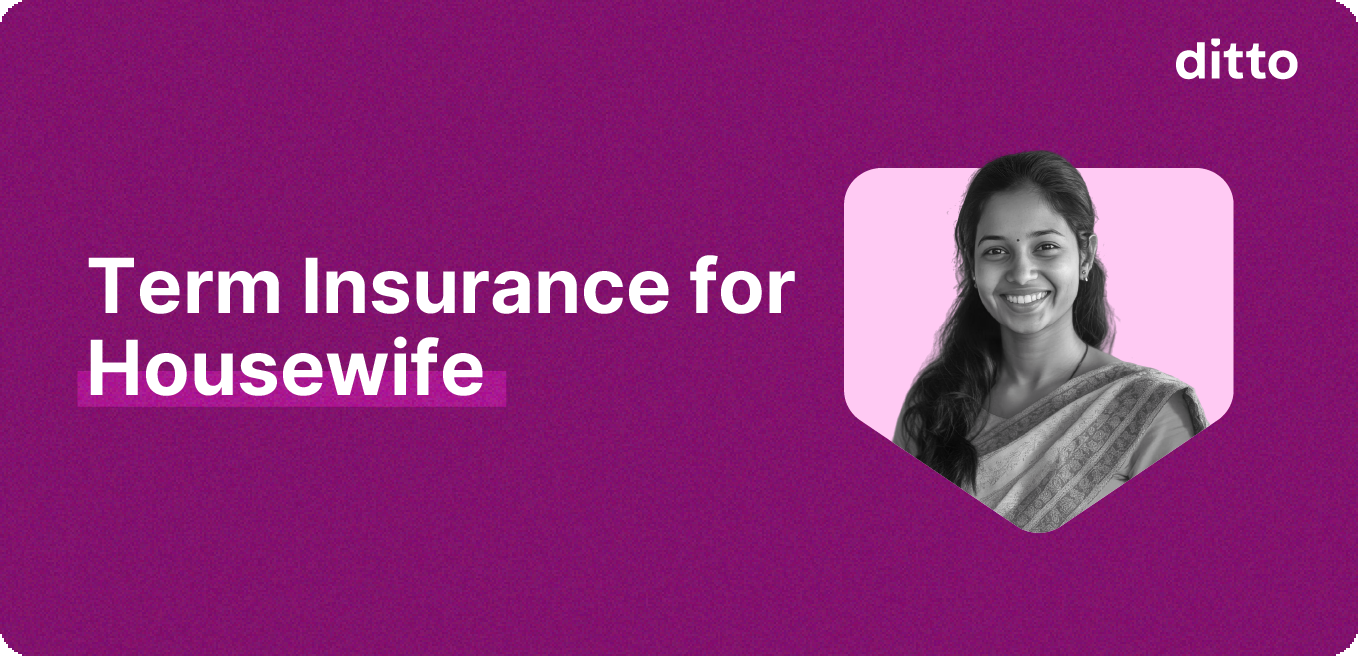Term insurance for housewife is a specialized option that allows coverage even without a personal income. Eligibility and sum assured are usually assessed based on the husband’s income and existing insurance, and underwriting conditions may be stricter than standard term plans.
In India, private insurers like Axis Max and HDFC Life offer term policies for housewives. Premiums are usually paid by the earning spouse (working husband) of the family. This guide discusses term life insurance for housewives, popular plans in India, and premium details.
Is a Housewife Eligible for Term Insurance?
How Does Term Insurance Work for a Housewife?
- It works similarly to a simple term plan. The premium is usually paid by the earning member of the family, most commonly the husband.
- The housewife is the life assured, while the policyholder can be either the housewife herself or her spouse, depending on the insurer’s rules.
- The nominee, typically the spouse or children, receives the claim amount to manage household expenses and replacement costs in case of an unfortunate event.
When insuring a housewife, families often debate between a separate or joint term plan. A separate individual policy is usually better as it offers clear coverage, simpler claims, and independent payout. Joint term plans are less common, often pay on first death, and can complicate benefits for the surviving spouse.
Additionally, premiums for women are more cost effective due to their lower mortality risk and higher life expectancy. They can receive term discounts up to 15%.
Take Note: In our experience, medical tests for the housewife are compulsory in almost all cases. Insurers generally prefer applicants who are graduates. While some may consider a 12th-pass profile, this usually requires higher income eligibility from the husband. Also, any existing life insurance policies in the wife’s name should be deducted from her total eligible cover.
Talk to an expert
today and
find
the right
insurance for you.

Popular Term Insurance Plans for Housewives
Before we discuss the list, we assess the plans through Ditto’s Cut to ensure strong coverage, clear features, and long-term value.

Axis Max Life Smart Term Plan Plus
Features:
- Critical Illness and Disability Rider (cover up to ₹15 lakhs for 64 illnesses)
- Accidental Death & Disability Rider
- Terminal Illness Benefit (up to ₹1 crore) and Life Line Plus
Eligibility Conditions
Term Premiums Across Ages
Note: The annual listed premiums are for a non-smoker profile, female (coverage till age 70, without first year discounts).

HDFC Life Click 2 Protect Supreme
Features:
- Disability & Critical Illness Premium Waiver
- Health Management Services & Premium break option
- Insta Payment on claim intimation and Inflation-linked cover
- Critical Illness Cover (60 illnesses, up to 15 Lakhs)
Eligibility Conditions
Term Premiums Across Ages
Note: The annual listed premiums are for a non-smoker profile, female (Coverage till age 70, without first year discounts).

ICICI Prudential iProtect Smart Plus
Features:
- Accidental Death & Disability Rider and Zero Cost Option
- Terminal Illness Payout (Entire base cover)
- Critical Illness Cover (60 illnesses, for up to ₹15 Lakhs)
Eligibility Conditions
- The housewife’s maximum eligible cover is limited to 50% of the husband’s existing life insurance or ₹1 crore, whichever is lower.
- To qualify for a ₹1 crore cover for the housewife, the husband must already have a life insurance cover of at least ₹2 crore.
Term Premiums Across Ages
Note: The annual listed premiums are for a non-smoker profile, female (Coverage till age 70, without first year discounts).

Bajaj Life eTouch II
Features:
- Critical Illness rider up to ₹20 lakhs & zero cost option
- Instant partial payout on claims and health management services.
- Inbuilt Waiver of Premium on Accidental Total & Permanent Disability
- Terminal Illness cover & Cover continuance benefit
Eligibility Conditions
Premiums Across Ages
Note: The annual listed premiums are for a non-smoker profile, female (Coverage till age 70, without first year discounts).
Did You Know?
Coverage Amount for Term Insurance for a Housewife
Term insurance for housewife in India often comes with tighter limits. The cover may be linked to the husband’s income and, in many cases, capped at around ₹1 crore. That’s why it’s worth choosing a plan with fewer restrictions and more flexible coverage limits.
For instance, policies like Axis Max Smart Term Plan Plus and HDFC Click 2 Protect Supreme cap the maximum cover at ₹1 crore.
Here’s a practical way to determine the required coverage amount:
- First, calculate your family’s total insurance needs based on monthly expenses, future goals like children’s education, and existing loans. Now, you can split the cover between spouses.
- Take a separate term insurance policy for the homemaker, usually up to around ₹1 crore, to cover household support and replacement costs.
- Take the remaining and larger portion of the cover on the husband, since higher sums are easier to justify based on income.
This approach avoids overloading one policy and ensures both risks are covered: loss of income and loss of household support. At Ditto, we use the expense and liabilities replacement method to estimate the term cover you require. To get a better understanding, use this online calculator to find the ideal cover for you.
In case you are wondering how long a term cover for a housewife should last? Here’s the answer:
The policy term should cover the years when the family depends most on the homemaker’s role. For many families, this is until ages 55–60, when children are largely independent and major loans are close to repayment. If kids are younger, liabilities are high, or retirement planning needs an extra buffer, extending the cover to 60–65 makes sense.
Simple Rule: Keep the policy active until the youngest child is financially independent and the surviving spouse can manage the household without paid help or compromising long-term goals.
Documents Required for Term Insurance for a Housewife
- Identity Proofs like Aadhar, Passport, Driving License or voter id for both husband and housewife
- Address proof both permanent and current
- Age proof, like a birth certificate
- Income proof of the spouse(husband), like Salary slips, Form 16 or bank statements
- Recent passport-size photo
What Is Covered and Not Covered Under Term Insurance for a Housewife?
Note: As per IRDAI rules, if the policyholder dies by suicide within the first year of buying or reviving the policy, the insurer will reject the claim and refund around 80% of the total premiums.
Benefits of Buying Term Insurance for a Housewife
Financial Security for the Family
Cost Replacement Protection
Peace of Mind for the Earning Member
Long-Term Support for Children’s Future
Why Choose Ditto for Term Insurance?
At Ditto, we’ve assisted over 8,00,000 customers with choosing the right insurance policy. Why customers like Vijay below love us:

- No-Spam & No Salesmen
- Rated 4.9/5 on Google Reviews by 15,000+ happy customers
- Backed by Zerodha
- Dedicated Claim Support Team
- 100% Free Consultation
You can book a FREE consultation. Slots are running out, so make sure you book a call now or chat with us on WhatsApp!
Ditto’s Take on Term Insurance for Housewives
Homemakers are the backbone of a family. Childcare, elder care, and daily household work have real economic value, even if they don’t come with a paycheck. The cost becomes clear only when this support is no longer there.
A term plan for a housewife helps replace this invisible contribution, giving the family financial support to manage day-to-day needs and secure a child’s future during a difficult time.
Disclaimer
Frequently Asked Questions
Why People Trust Ditto
Last updated on:




